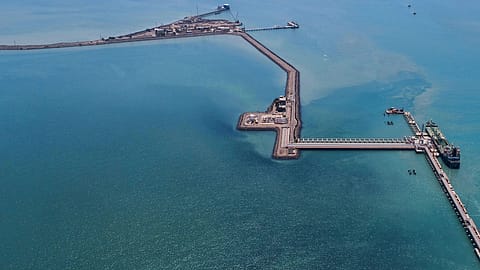Nayara Energy’s petchem project, expansion, and stake sale hit a roadblock with EU sanctions
The EU's sanctions have severely impacted Nayara Energy, derailing Rosneft's stake sale and hindering the company's petrochemical and retail expansion plans. Nayara is dealing with reduced refining capacity and digital service suspensions while pursuing legal action to challenge the sanctions and ensure compliance with Indian regulations.

Nayara Energy, India’s second-largest private oil refiner, is navigating a deepening crisis following the European Union’s sanctions imposed in mid-July, which derailed Russian oil giant Rosneft’s planned divestment of its 49.13% stake in the company and triggered significant operational and financial hurdles. Industry sources say that the sanctions will have an adverse impact on the refiner’s plan to build the petrochemical complex and expand its retail network.
The company, which runs the refinery in Vadinar, Gujarat, with a capacity of 20 million tonne per annum (MTPA), has been planning to invest $8 billion (₹68,000 crore) to set up a 1.5-MTPA ethane cracker at the refinery. An ethane cracker breaks down hydrocarbons into ethylene, a key chemical used in making plastics, adhesives and other petrochemicals. According to the company website, it has over 6,500 petrol pumps operational nationwide and is looking ahead to reaching a target of over 8,200 petrol pumps by 2025.
Nayara’s expansion and forays into new segments were expected to change the refining and petrochemicals landscape in India. Nayara is the first Indian entity which has been targeted by the EU with its sanctions package, citing its ties to Russian ownership and its reliance on Russian crude oil. In 2017, Russian oil giant Rosneft bought a 49.13% stake in Essar Oil’s refinery, captive port and power plant for $12.9 billion and named the company Nayara Energy. French commodities trading firm Trafigura and Cyprus-based Russian investment group United Capital Partners had also bought a similar-sized holding in the company. Trafigura later sold its 24.5% stake to Rome-based energy investment group Hara Capital Sarl in 2023.
The sanction measures go beyond export restrictions, imposing asset freezes, shipping and insurance limitations, and a dynamic price cap on Russian oil set to take effect in September. It effectively stalled Rosneft’s efforts to sell its stake in Nayara, previously valued at approximately $17–20 billion, with potential interest from major Indian players like Reliance Industries and the Adani Group. The sanctions and the related compliance risks have cooled investor enthusiasm, say sources.
Nayara is now facing operational challenges following several shipping companies and oil traders have begun to distance themselves from the company. The reports say that at least two tankers recently refused to load fuel at Nayara’s Vadinar refinery, and another vessel carrying Russian crude was rerouted, signalling a broader retreat by maritime partners. These disruptions led to storage constraints, forcing Nayara to reduce its refining output to 70–80% of its 400,000-barrel-per-day capacity, a sharp decline from earlier full-capacity operations.
The impact of sanctions extends to Nayara’s digital infrastructure, with Microsoft suspending critical services, including Outlook email, Teams collaboration tools, and access to proprietary data, citing compliance with EU regulations. In response, Nayara filed a lawsuit in the Delhi High Court, seeking an injunction to restore access and criticising Microsoft’s actions as an overreach of legal authority. The court issued a notice to the US tech giant.
Leadership changes also added to the turmoil. Recently, CEO Alessandro des Dorides stepped down, and Sergey Denisov was appointed as his successor, tasked with steering the company through this challenging period.
Recommended Stories
Nayara has condemned the EU sanctions as “unjust” and an infringement on India’s sovereignty and energy security, stressing its critical role in supplying approximately 8% of India’s refining capacity and operating an extensive retail network. Despite these global disruptions, Nayara insists its domestic operations remain fully compliant with Indian regulations and continue to serve the local market. The company is exploring legal options to contest its inclusion on the EU sanctions list and restore operational stability.
